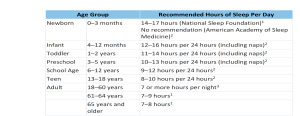Sleep’s Role in Health during the Pandemic
The coronavirus has disrupted lives, work and school routines and even sleep patterns. As you continue to adjust to the pandemic, it is important to evaluate your sleep health. Healthy sleep habits can improve your immune system, your mood, and productivity. Plus, a good night’s rest can lessen anxiety. To give your body its best chance of fighting illness, staying healthy, and working to its full potential, include healthy sleep habits in your daily routine.
Sleep Well!
Many of us think we can get by with a few hours of sleep and still perform well at work, home, or school. Research tells us that is not true. Sleep, like good nutrition and physical exercise, is essential to a healthy body and mind. Sleep deprivation is linked to an increase in chronic diseases, a compromised immune system, and can impact your emotional health. Individuals that have healthy sleep patterns may have better weight control, a stronger immune system, more energy, less depression or mood swings, and increased productivity at home and work.
How much sleep do I need?
According to the Center for Disease Control (CDC), your sleep requirements change with your age and health.

The amount of sleep hours is important, but so is the quality of your sleep. Poor quality sleep will leave you feeling tired and not rested when you awake, even if you have met the recommended hours of sleep that day. Poor quality sleep can occur from frequent waking during sleep, experiencing sleep disorders (such as snoring and awaking gasping for air), or restless sleep. Your activities before bedtime can impact a healthy sleep. What you do, watch, eat, or drink may either help promote sleep or interfere with sleep.
Sleep hygiene
Healthy habits to improve your sleep are called sleep hygiene. For improved sleep, try these sleep hygiene guidelines from the University of Florida.
- Keep a consistent sleep and rise time. Avoid afternoon naps.
- Remove electronic devices from the bedroom (TV, computer, radio, smart phone).
- Limit your bed to sleep or intimacy only.
- Keep the bedroom dark, quiet, and maintain a comfortable temperature.
- White noise may help by obscuring other noises. (Such as the hum of the air conditioner or a fan)
- Limit fluids after 8:00 PM. This may reduce urination needs during sleep hours.
- Avoid nicotine, alcohol, and large meals 30-45 minutes before bed.
- Avoid caffeine from four to six hours prior to bed. It is a stimulant and may interfere with sleep.
- Be physically active during the daytime. Avoid vigorous exercise at bedtime.
- Write nagging worries on a bedside notepad when they occur to help you forget them.
- Establish an evening ritual to promote sleep (warm bath, dental hygiene, yoga, or religious observance).
Good sleep hygiene may help initiate or maintain a good sleep pattern. However, some sleep-related challenges may be caused by sleep disorders. If you believe your sleep deprivation is the result of a medical issue, contact your healthcare provider for an evaluation.
Take care of your health! Sleep well!
The Live COVID SMART blog series was developed to promote resilience in response to the COVID-19 pandemic. Contributing authors: Beth Kerr, Lori Wiggins, Kim Griffin, Marcia Brown, Heidi Radunovich, John Diaz, and LaToya J. O’Neal. This work is supported by the Rural Health and Safety Education Program [grant no. 2021-46100-35459].
References
Centers for Disease Control and Prevention. (2018, August 8). How Much Sleep Do I Need? Retrieved November 2, 2021, from https://www.cdc.gov/sleep/about_sleep/how_much_sleep.html.
UF Health. (2021, November 2). Sleep Hygiene Guidelines. Retrieved November 2, 2021, from https://m.ufhealth.org/shands-sleep-disorders-center/sleep-hygiene-guidelines.
 1
1
